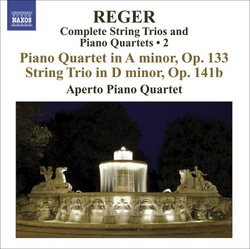| All Artists: Max Reger, Aperto Piano Quartet, Frank-Immo Zichner Title: Reger: Complete String Trios & Piano Quartets, Vol. 2 Members Wishing: 0 Total Copies: 0 Label: Naxos Original Release Date: 1/1/2008 Re-Release Date: 10/28/2008 Genre: Classical Styles: Chamber Music, Historical Periods, Classical (c.1770-1830) Number of Discs: 1 SwapaCD Credits: 1 UPC: 747313078677 |
Search - Max Reger, Aperto Piano Quartet, Frank-Immo Zichner :: Reger: Complete String Trios & Piano Quartets, Vol. 2
 | Max Reger, Aperto Piano Quartet, Frank-Immo Zichner Reger: Complete String Trios & Piano Quartets, Vol. 2 Genre: Classical |
Larger Image |
CD Details |
CD ReviewsTwo Contrasting Late Reger Chamber Works J Scott Morrison | Middlebury VT, USA | 11/05/2008 (4 out of 5 stars) "Reger was a master of counterpoint and of chromatic harmony. But late in his life -- he died at only 43 -- the harmonies tended to become more and more clotted. And that certainly is the case with the late Second Piano Quartet, Op. 133. Of interest, though, is that the counterpoint is rather muted. This is largely because the strings are very often used in unison or parallel thirds and sixths. The piano part tends to be bass-dominant, leading to even more dense harmonies. Consequently, this quartet is, for me at least, difficult to love. There are nice things in it, of course, not least the eerily scurrying Scherzo which sometimes even threatens to become playful. The Largo is often tender and is easily the most tuneful and peaceful of the quartet's four movements. The Finale returns to the macabre world of the Scherzo and adds to it a grimness that finally subsides into a pianissimo conclusion. It may be that since this work was written after Reger had suffered a mental breakdown from the onerous work pressures as director of the Meiningen court orchestra, its grayness has its origins in Reger's own mental state. Whatever the case, it is not, in my view, a listener-friendly work. One cannot quibble, however, about the performance by the Aperto Piano Quartet, who do as much as is possible for this refractory piece.
The String Trio, Op. 141b, came a year or so later, after Reger had moved from Meiningen to Jena. This was a period when he experienced few work pressures and enjoyed a more relaxed and peaceful atmosphere, all reflected in this work. Reger revered Mozart and obviously, from this work, it seems clear that he particularly loved the sound-world of Mozart's exalted string trio, the Divertimento in E Flat, K. 563. Although this work does not sound like Mozart per se, Reger's Mozartean fluency is obvious. Not for Reger the departure from tonality upon which Schoenberg and his school had embarked; there is chromaticism, yes, but there is also clear allegiance to tonality. The work is definitely in D minor. The Allegro first movement has a classically clear form, and it has a particularly fetching second theme which becomes more and more prominent as the movement develops. The Andante, a set of variations on a particularly tender theme, is the emotional center of the work and pays much relistening as its felicities slowly reveal themselves. The finale is one of Reger's masterful fugues, this one as graceful as any he ever wrote. This string trio deserves to stand in the same company as the Mozart Divertimento and one could only hope that this recording will inspire other musicians to include it in their repertoires. Heartily recommended for the Trio. Scott Morrison" |
